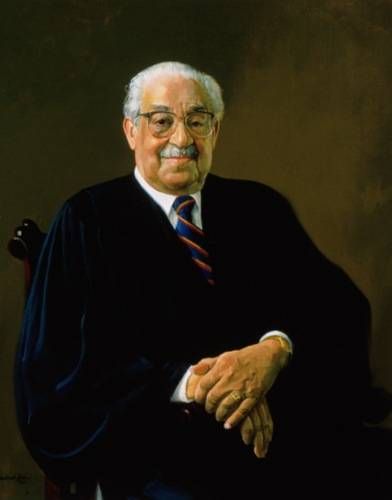Cross posted from The Stars Hollow Gazette
This is your morning Open Thread. Pour a cup of your favorite morning beverage and review the past and comment on the future.
Find the past “On This Day in History” here.
August 30 is the 242nd day of the year (243rd in leap years) in the Gregorian calendar. There are 123 days remaining until the end of the year.
On this day in 1967, Thurgood Marshall becomes the first African American to be confirmed as a Supreme Court justice. He would remain on the Supreme Court for 24 years before retiring for health reasons, leaving a legacy of upholding the rights of the individual as guaranteed by the U.S. Constitution.
Thurgood Marshall (July 2, 1908 – January 24, 1993) was an American jurist and the first African American to serve on the Supreme Court of the United States. Before becoming a judge, he was a lawyer who was best remembered for his high success rate in arguing before the Supreme Court and for the victory in Brown v. Board of Education. He was nominated to the court by President Lyndon Johnson in 1967.
Marshall was born in Baltimore, Maryland on July 2, 1908, the great-grandson of a slave who was born in modern-day Democratic Republic of the Congo.His original name was Thoroughgood, but he shortened it to Thurgood in second grade because he disliked spelling it. His father, William Marshall, who was a railroad porter, instilled in him an appreciation for the Constitution of the United States and the rule of law.
Marshall graduated from Frederick Douglass High School in Baltimore in 1925 and from Lincoln University in Pennsylvania in 1930. Afterward, Marshall wanted to apply to his hometown law school, the University of Maryland School of Law, but the dean told him that he would not be accepted because of the school’s segregation policy. Later, as a civil rights litigator, he successfully sued the school for this policy in the case of Murray v. Pearson. As he could not attend the University of Maryland, Marshall sought admission and was accepted at Howard University School of Law.
Marshall received his law degree from the Howard University School of Law in 1933 where he graduated first in his class.
Marshall won his very first U.S. Supreme Court case, Chambers v. Florida, 309 U.S. 227 (1940), at the age of 32. That same year, he was appointed Chief Counsel for the NAACP. He argued many other cases before the Supreme Court, most of them successfully, including Smith v. Allwright, 321 U.S. 649 (1944); Shelley v. Kraemer, 334 U.S. 1 (1948); Sweatt v. Painter, 339 U.S. 629 (1950); and McLaurin v. Oklahoma State Regents, 339 U.S. 637 (1950). His most famous case as a lawyer was Brown v. Board of Education of Topeka, 347 U.S. 483 (1954), the case in which the Supreme Court ruled that “separate but equal” public education, as established by Plessy v. Ferguson, was not applicable to public education because it could never be truly equal. In total, Marshall won 29 out of the 32 cases he argued before the Supreme Court.
Marshall served on the Court for the next twenty-four years, compiling a liberal record that included strong support for Constitutional protection of individual rights, especially the rights of criminal suspects against the government. His most frequent ally on the Court (indeed, the pair rarely voted at odds) was Justice William Brennan, who consistently joined him in supporting abortion rights and opposing the death penalty. Brennan and Marshall concluded in Furman v. Georgia that the death penalty was, in all circumstances, unconstitutional, and never accepted the legitimacy of Gregg v. Georgia, which ruled four years later that the death penalty was constitutional in some circumstances. Thereafter, Brennan or Marshall dissented from every denial of certiorari in a capital case and from every decision upholding a sentence of death.[citation needed] In 1987, Marshall gave a controversial speech on the occasion of the bicentennial celebrations of the Constitution of the United States. Marshall stated,
“the government they devised was defective from the start, requiring several amendments, a civil war, and major social transformations to attain the system of constitutional government and its respect for the freedoms and individual rights, we hold as fundamental today.”
In conclusion Marshall stated
“Some may more quietly commemorate the suffering, struggle, and sacrifice that has triumphed over much of what was wrong with the original document, and observe the anniversary with hopes not realized and promises not fulfilled. I plan to celebrate the bicentennial of the Constitution as a living document, including the Bill of Rights and the other amendments protecting individual freedoms and human rights.”
He retired from the Supreme Court in 1991, and was reportedly unhappy that it would fall to President George H. W. Bush to name his replacement. Bush nominated Clarence Thomas to replace Marshall.
Marshall died of heart failure at the National Naval Medical Center in Bethesda, Maryland, at 2:58 p.m. on January 24, 1993 at the age of 84. He is buried in Arlington National Cemetery. His second wife and their two sons survived him
On November 30, 1993, Justice Marshall was posthumously awarded the Presidential Medal of Freedom by President Bill Clinton.





